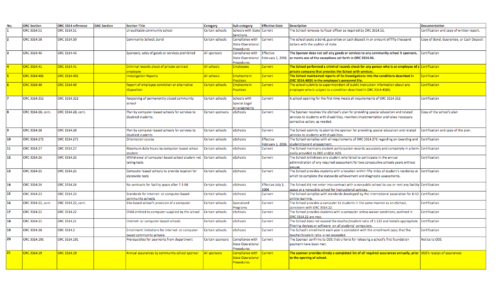Crazy Compliance Requirements for Ohio Charter Schools
Charter school sponsors will be spending the better part of July submitting documents for a new evaluation process that some argue is cumbersome and makes it impossible to receive perfect marks.
The new evaluation framework – which was created by an advisory panel following a discovery last summer that the previous ratings were being calculated illegally – grades sponsors on academic performance, quality and compliance.
Charter school advocates initially took issue with the academic piece of the assessment because traditional schools were provided safe harbor from report card scores. They’re now turning their ire toward a list of compliance requirements that were released last week.
The list includes 319 state laws and rules pertaining to charter schools that sponsors must provide evidence they’re complying with. Previously, documentation was required for only 23 components in the compliance portion of the evaluation.
To top it off, the state’s 36 sponsors – some of which oversee dozens of schools – were given one month to submit compliance documentation to the Department of Education.
Peggy Young, president of the Ohio Association of Charter School Authorizers, said it will be impossible for some sponsors to gather potentially tens of thousands of documents and check compliance with every law in such a short time frame.
“It’s going to take so much of our time that we can’t even focus on the things that we want to or should be focusing on,” she said.
Sponsors are supposed to be autonomous from the schools they oversee, but some of the compliance requirements would require them to get involved in daily operations and spend a significant amount of time in the buildings, she added.
There are also items on the list that sponsors are not qualified to certify, such as proof that there is no lead in the paint or that certain fire codes are met, said Jennifer Robison, associate director of Buckeye Community Hope Foundation.
As the sponsor of more than 40 schools, the foundation will likely have to beef up its staff and possibly contract with professionals in certain fields to ensure that all compliance measures are being met, she said.
Sponsors want to be compliant in all areas, Ms. Robison said, but the evaluation should be more like an audit that takes random samples instead of requiring sponsors to provide documentation to support every law on the books.
“I feel like we’re being held to a completely different standard as a public school than all the traditional public schools and this is not what we should be spending our time and focus on. It should be on improving the schools, helping the schools, making sure they’re providing a quality education to students – not whether they have a flag five feet in length,” she said, referring to item number 209 on the compliance list.
A number of sponsors have replied to ODE’s email that detailed the compliance requirements with similar concerns and claims that they won’t meet the July 25 deadline.
Read the full article here (registration required).











